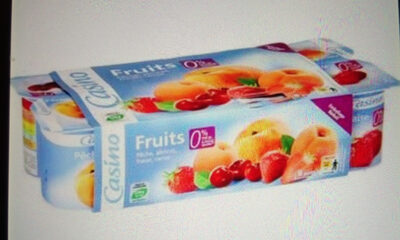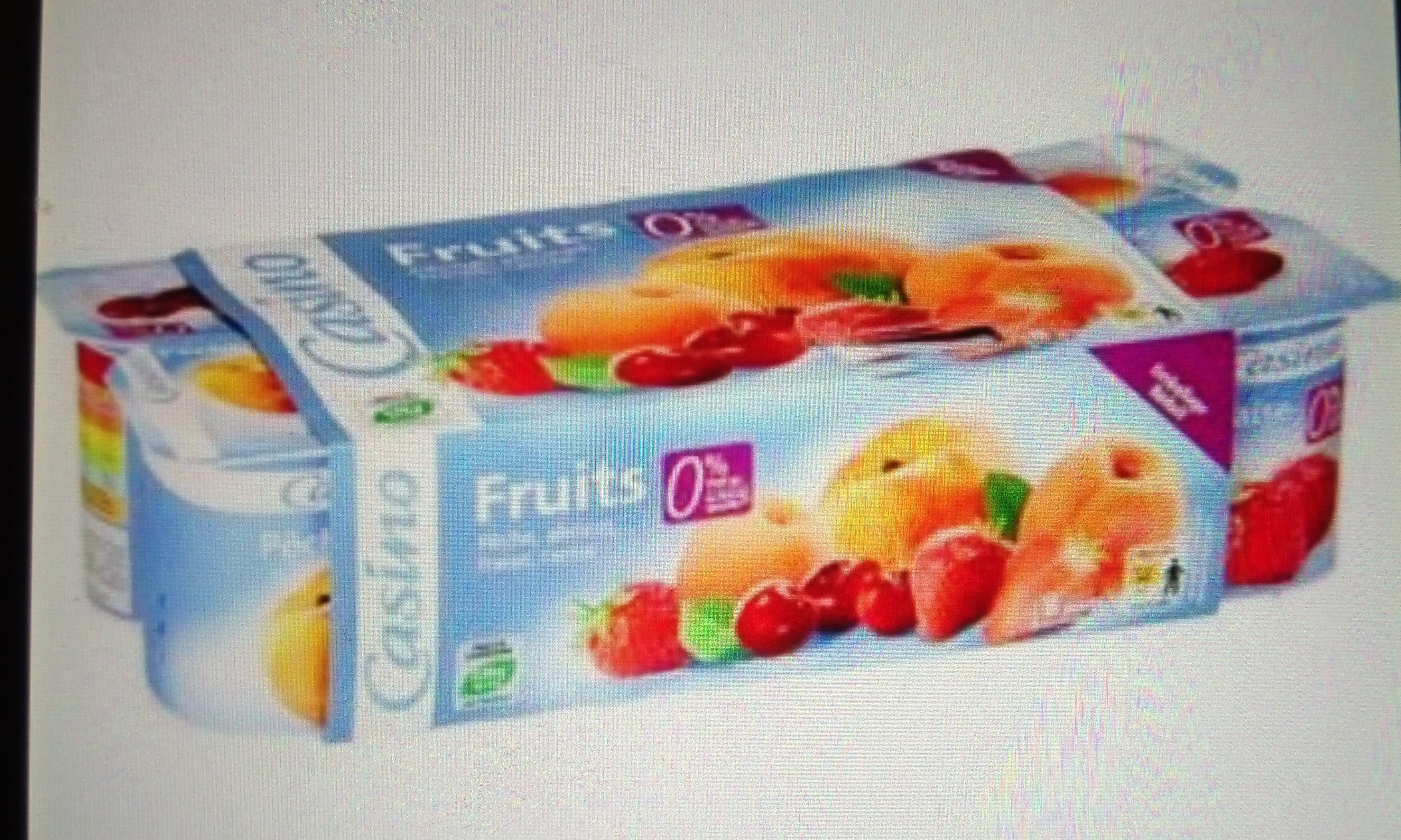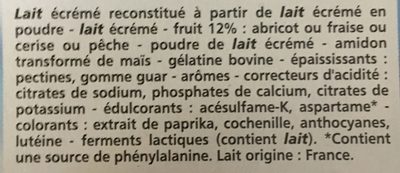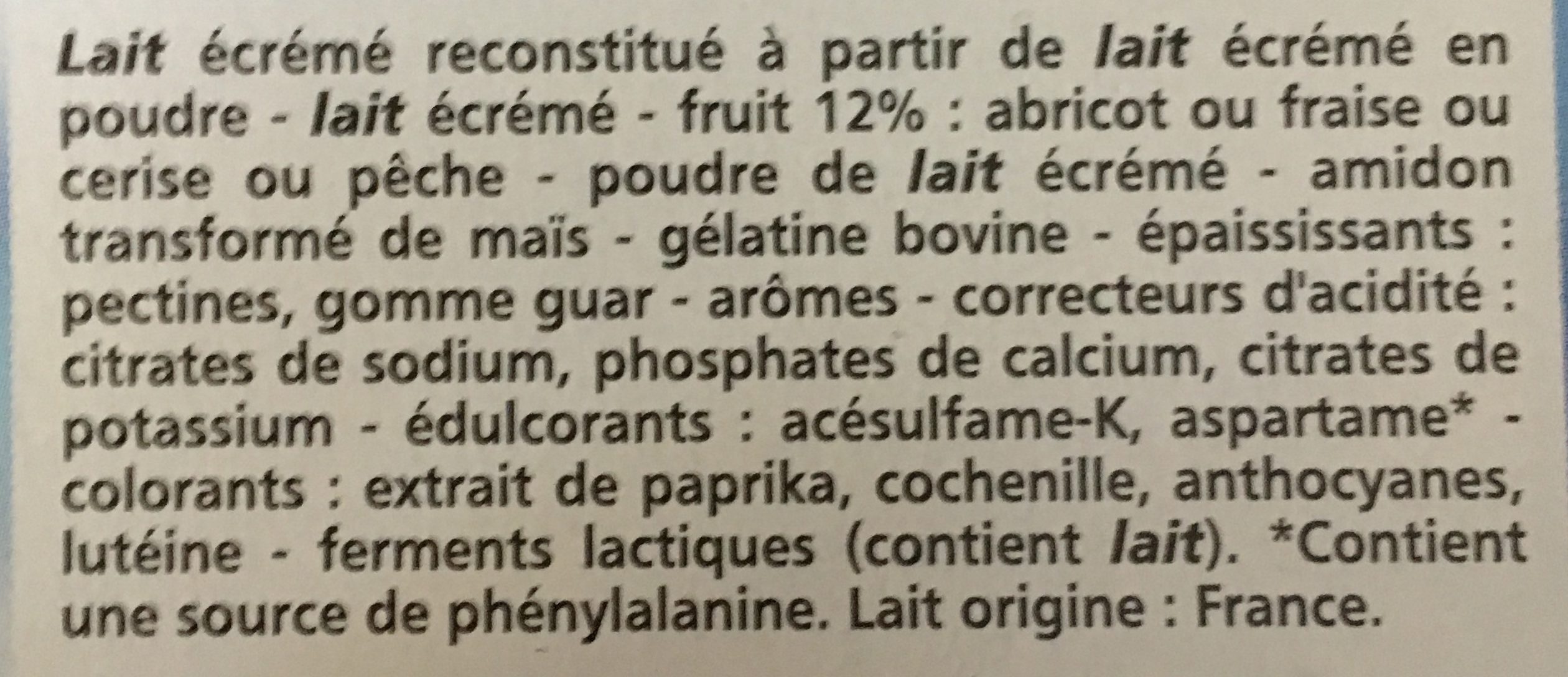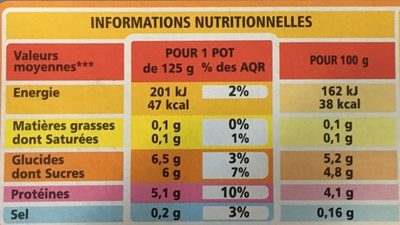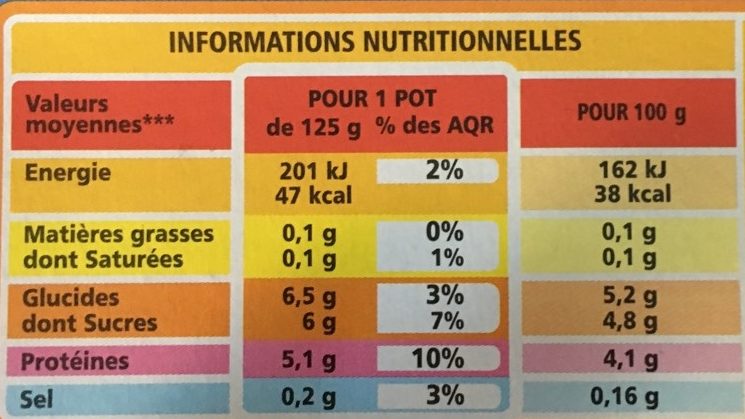Help us make food transparency the norm!
As a non-profit organization, we depend on your donations to continue informing consumers around the world about what they eat.
The food revolution starts with you!
Fruits 0% de mat. gr. 0% de sucres ajoutés** - Casino - 8 x 125 g
Fruits 0% de mat. gr. 0% de sucres ajoutés** - Casino - 8 x 125 g
This product page is not complete. You can help to complete it by editing it and adding more data from the photos we have, or by taking more photos using the app for Android or iPhone/iPad. Thank you!
×
Some of the data for this product has been provided directly by the manufacturer casino.
Barcode: 3222473627479 (EAN / EAN-13)
Common name: Spécialité laitière maigre aux fruits avec édulcorants
Quantity: 8 x 125 g
Packaging: Plastic, Pot, Cardboard, Fresh
Brands: Casino
Categories: Dairies, Fermented foods, Fermented milk products, Desserts, Dairy desserts, Fermented dairy desserts, Fermented dairy desserts with fruits, Yogurts, Fruit yogurts, Fruit yogurts with fruit chunks, Low-fat yogurts
Labels, certifications, awards:
Low or no fat, Low or no sugar, Low fat, Reduced fat, Contains a source of phenylalanine, French milk, Green Dot, No fat, No sugar, With sweeteners
Origin of ingredients: France
Stores: Casino
Countries where sold: France
Matching with your preferences
Health
Ingredients
-
24 ingredients
: lait écrémé reconstitué à partir de lait écrémé en poudre - lait écrémé - fruit 12% : abricot ou fraise ou cerise ou pêche - poudre de lait écrémé - amidon transformé de maïs - gélatine bovine - épaississants : pectines, gomme guar - arômes - correcteurs d'acidité : citrates de sodium , phosphates de calcium, citrates de potassium - édulcorants : acésulfame-k, aspartame* - colorants : extrait de paprika, cochenille, anthocyanes, lutéine - ferments lactiques. *contient une source de phénylalanineAllergens: Milk
Food processing
-
Ultra processed foods
Elements that indicate the product is in the 4 - Ultra processed food and drink products group:
- Additive: E120 - Cochineal
- Additive: E14XX - Modified Starch
- Additive: E160c - Paprika extract
- Additive: E161b - Lutein
- Additive: E163 - Anthocyanins
- Additive: E412 - Guar gum
- Additive: E428 - Gelatine
- Additive: E440 - Pectins
- Additive: E950 - Acesulfame k
- Additive: E951 - Aspartame
- Ingredient: Colour
- Ingredient: Flavouring
- Ingredient: Sweetener
- Ingredient: Thickener
Food products are classified into 4 groups according to their degree of processing:
- Unprocessed or minimally processed foods
- Processed culinary ingredients
- Processed foods
- Ultra processed foods
The determination of the group is based on the category of the product and on the ingredients it contains.
Additives
-
E120 - Cochineal
Carminic acid: Carminic acid -C22H20O13- is a red glucosidal hydroxyanthrapurin that occurs naturally in some scale insects, such as the cochineal, Armenian cochineal, and Polish cochineal. The insects produce the acid as a deterrent to predators. An aluminum salt of carminic acid is the coloring agent in carmine. Synonyms are C.I. 75470 and C.I. Natural Red 4. The chemical structure of carminic acid consists of a core anthraquinone structure linked to a glucose sugar unit. Carminic acid was first synthesized in the laboratory by organic chemists in 1991.Source: Wikipedia
-
E163 - Anthocyanins
Anthocyanin: Anthocyanins -also anthocyans; from Greek: ἄνθος -anthos- "flower" and κυάνεος/κυανοῦς kyaneos/kyanous "dark blue"- are water-soluble vacuolar pigments that, depending on their pH, may appear red, purple, or blue. Food plants rich in anthocyanins include the blueberry, raspberry, black rice, and black soybean, among many others that are red, blue, purple, or black. Some of the colors of autumn leaves are derived from anthocyanins.Anthocyanins belong to a parent class of molecules called flavonoids synthesized via the phenylpropanoid pathway. They occur in all tissues of higher plants, including leaves, stems, roots, flowers, and fruits. Anthocyanins are derived from anthocyanidins by adding sugars. They are odorless and moderately astringent. Although approved to color foods and beverages in the European Union, anthocyanins are not approved for use as a food additive because they have not been verified as safe when used as food or supplement ingredients. There is no conclusive evidence anthocyanins have any effect on human biology or diseases.Source: Wikipedia
-
E331 - Sodium citrates
Sodium citrate: Sodium citrate may refer to any of the sodium salts of citrate -though most commonly the third-: Monosodium citrate Disodium citrate Trisodium citrateThe three forms of the salt are collectively known by the E number E331. Sodium citrates are used as acidity regulators in food and drinks, and also as emulsifiers for oils. They enable cheeses to melt without becoming greasy.Source: Wikipedia
-
E332 - Potassium citrates
Potassium citrate: Potassium citrate -also known as tripotassium citrate- is a potassium salt of citric acid with the molecular formula K3C6H5O7. It is a white, hygroscopic crystalline powder. It is odorless with a saline taste. It contains 38.28% potassium by mass. In the monohydrate form it is highly hygroscopic and deliquescent. As a food additive, potassium citrate is used to regulate acidity and is known as E number E332. Medicinally, it may be used to control kidney stones derived from either uric acid or cystine.Source: Wikipedia
-
E341 - Calcium phosphates
Calcium phosphate: Calcium phosphate is a family of materials and minerals containing calcium ions -Ca2+- together with inorganic phosphate anions. Some so-called calcium phosphates contain oxide and hydroxide as well. They are white solids of nutritious value.Source: Wikipedia
-
E412 - Guar gum
Guar gum (E412) is a natural food additive derived from guar beans.
This white, odorless powder is valued for its remarkable thickening and stabilizing properties, making it a common ingredient in various food products, including sauces, dressings, and ice creams.
When used in moderation, guar gum is considered safe for consumption, with no known adverse health effects.
-
E440 - Pectins
Pectins (E440) are natural carbohydrates, predominantly found in fruits, that act as gelling agents in the food industry, creating the desirable jelly-like texture in jams, jellies, and marmalades.
Pectins stabilize and thicken various food products, such as desserts, confectioneries, and beverages, ensuring a uniform consistency and quality.
Recognized as safe by various health authorities, pectins have been widely used without notable adverse effects when consumed in typical dietary amounts.
-
E950 - Acesulfame k
Acesulfame potassium: Acesulfame potassium - AY-see-SUL-faym-, also known as acesulfame K -K is the symbol for potassium- or Ace K, is a calorie-free sugar substitute -artificial sweetener- often marketed under the trade names Sunett and Sweet One. In the European Union, it is known under the E number -additive code- E950. It was discovered accidentally in 1967 by German chemist Karl Clauss at Hoechst AG -now Nutrinova-. In chemical structure, acesulfame potassium is the potassium salt of 6-methyl-1‚2,3-oxathiazine-4-3H--one 2‚2-dioxide. It is a white crystalline powder with molecular formula C4H4KNO4S and a molecular weight of 201.24 g/mol.Source: Wikipedia
-
E951 - Aspartame
Aspartame: Aspartame -APM- is an artificial non-saccharide sweetener used as a sugar substitute in some foods and beverages. In the European Union, it is codified as E951. Aspartame is a methyl ester of the aspartic acid/phenylalanine dipeptide. A panel of experts set up by the European Food Safety Authority concluded in 2013 that aspartame is safe for human consumption at current levels of exposure. As of 2018, evidence does not support a long-term benefit for weight loss or in diabetes. Because its breakdown products include phenylalanine, people with the genetic condition phenylketonuria -PKU- must be aware of this as an additional source.It was first sold under the brand name NutraSweet. It was first made in 1965, and the patent expired in 1992. It was initially approved for use in food products by the U.S. Food and Drug Administration -FDA- in 1981. The safety of aspartame has been the subject of several political and medical controversies, United States congressional hearings, and Internet hoaxes.Source: Wikipedia
Ingredients analysis
-
Palm oil free
No ingredients containing palm oil detected
Unrecognized ingredients: fr:lait-ecreme-reconstitue-a-partir-de-lait-ecreme-en-poudre, fr:abricot-et-fraise-et-cerise-et-pecheSome ingredients could not be recognized.
We need your help!
You can help us recognize more ingredients and better analyze the list of ingredients for this product and others:
- Edit this product page to correct spelling mistakes in the ingredients list, and/or to remove ingredients in other languages and sentences that are not related to the ingredients.
- Add new entries, synonyms or translations to our multilingual lists of ingredients, ingredient processing methods, and labels.
If you would like to help, join the #ingredients channel on our Slack discussion space and/or learn about ingredients analysis on our wiki. Thank you!
-
Non-vegan
Non-vegan ingredients: Skimmed milk, Skimmed milk powder, Beef gelatin, E120Some ingredients could not be recognized.
We need your help!
You can help us recognize more ingredients and better analyze the list of ingredients for this product and others:
- Edit this product page to correct spelling mistakes in the ingredients list, and/or to remove ingredients in other languages and sentences that are not related to the ingredients.
- Add new entries, synonyms or translations to our multilingual lists of ingredients, ingredient processing methods, and labels.
If you would like to help, join the #ingredients channel on our Slack discussion space and/or learn about ingredients analysis on our wiki. Thank you!
-
Non-vegetarian
Non-vegetarian ingredients: Beef gelatin, E120Some ingredients could not be recognized.
We need your help!
You can help us recognize more ingredients and better analyze the list of ingredients for this product and others:
- Edit this product page to correct spelling mistakes in the ingredients list, and/or to remove ingredients in other languages and sentences that are not related to the ingredients.
- Add new entries, synonyms or translations to our multilingual lists of ingredients, ingredient processing methods, and labels.
If you would like to help, join the #ingredients channel on our Slack discussion space and/or learn about ingredients analysis on our wiki. Thank you!
-
Details of the analysis of the ingredients
We need your help!
Some ingredients could not be recognized.
We need your help!
You can help us recognize more ingredients and better analyze the list of ingredients for this product and others:
- Edit this product page to correct spelling mistakes in the ingredients list, and/or to remove ingredients in other languages and sentences that are not related to the ingredients.
- Add new entries, synonyms or translations to our multilingual lists of ingredients, ingredient processing methods, and labels.
If you would like to help, join the #ingredients channel on our Slack discussion space and/or learn about ingredients analysis on our wiki. Thank you!
: _lait_ écrémé reconstitué à partir de _lait_ écrémé en poudre, _lait_ écrémé, fruit 12% (abricot et fraise et cerise et pêche), poudre de _lait_ écrémé, amidon transformé de maïs, gélatine bovine, épaississants (pectines), gomme guar, arômes, correcteurs d'acidité (citrates de sodium), phosphates de calcium, citrates de potassium, édulcorants (acésulfame-k), aspartame, colorants (extrait de paprika), cochenille, anthocyanes, lutéine, ferments _lactiques_- _lait_ écrémé reconstitué à partir de _lait_ écrémé en poudre -> fr:lait-ecreme-reconstitue-a-partir-de-lait-ecreme-en-poudre - percent_min: 12 - percent_max: 76
- _lait_ écrémé -> en:skimmed-milk - vegan: no - vegetarian: yes - ciqual_proxy_food_code: 19051 - percent_min: 12 - percent_max: 44
- fruit -> en:fruit - vegan: yes - vegetarian: yes - percent_min: 12 - percent: 12 - percent_max: 12
- abricot et fraise et cerise et pêche -> fr:abricot-et-fraise-et-cerise-et-peche - percent_min: 12 - percent_max: 12
- poudre de _lait_ écrémé -> en:skimmed-milk-powder - vegan: no - vegetarian: yes - ciqual_food_code: 19054 - percent_min: 0 - percent_max: 12
- amidon transformé de maïs -> en:modified-corn-starch - vegan: yes - vegetarian: yes - ciqual_food_code: 9510 - percent_min: 0 - percent_max: 12
- gélatine bovine -> en:beef-gelatin - vegan: no - vegetarian: no - percent_min: 0 - percent_max: 12
- épaississants -> en:thickener - percent_min: 0 - percent_max: 12
- pectines -> en:e440a - vegan: yes - vegetarian: yes - percent_min: 0 - percent_max: 12
- gomme guar -> en:e412 - vegan: yes - vegetarian: yes - percent_min: 0 - percent_max: 12
- arômes -> en:flavouring - vegan: maybe - vegetarian: maybe - percent_min: 0 - percent_max: 5
- correcteurs d'acidité -> en:acidity-regulator - percent_min: 0 - percent_max: 5
- citrates de sodium -> en:e331 - vegan: yes - vegetarian: yes - percent_min: 0 - percent_max: 5
- phosphates de calcium -> en:e341 - vegan: yes - vegetarian: yes - percent_min: 0 - percent_max: 5
- citrates de potassium -> en:e332 - vegan: yes - vegetarian: yes - percent_min: 0 - percent_max: 5
- édulcorants -> en:sweetener - percent_min: 0 - percent_max: 5
- acésulfame-k -> en:e950 - vegan: yes - vegetarian: yes - percent_min: 0 - percent_max: 5
- aspartame -> en:e951 - vegan: yes - vegetarian: yes - percent_min: 0 - percent_max: 5
- colorants -> en:colour - percent_min: 0 - percent_max: 5
- extrait de paprika -> en:e160c - vegan: yes - vegetarian: yes - percent_min: 0 - percent_max: 5
- cochenille -> en:e120 - vegan: no - vegetarian: no - percent_min: 0 - percent_max: 5
- anthocyanes -> en:e163 - vegan: yes - vegetarian: yes - percent_min: 0 - percent_max: 5
- lutéine -> en:e161b - vegan: yes - vegetarian: yes - percent_min: 0 - percent_max: 4.75
- ferments _lactiques_ -> en:lactic-ferments - vegan: maybe - vegetarian: yes - percent_min: 0 - percent_max: 4.47058823529412
en:milk -> en:milk
Nutrition
-
Very good nutritional quality
⚠ ️Warning: the amount of fruits, vegetables and nuts is not specified on the label, it was estimated from the list of ingredients: 12This product is not considered a beverage for the calculation of the Nutri-Score.
Positive points: 2
- Proteins: 2 / 5 (value: 4.1, rounded value: 4.1)
- Fiber: 0 / 5 (value: 0.2, rounded value: 0.2)
- Fruits, vegetables, nuts, and colza/walnut/olive oils: 0 / 5 (value: 12, rounded value: 12)
Negative points: 1
- Energy: 0 / 10 (value: 162, rounded value: 162)
- Sugars: 1 / 10 (value: 4.8, rounded value: 4.8)
- Saturated fat: 0 / 10 (value: 0.1, rounded value: 0.1)
- Sodium: 0 / 10 (value: 64, rounded value: 64)
The points for proteins are counted because the negative points are less than 11.
Nutritional score: (1 - 2)
Nutri-Score:
-
Nutrient levels
-
Fat in low quantity (0.1%)
What you need to know- A high consumption of fat, especially saturated fats, can raise cholesterol, which increases the risk of heart diseases.
Recommendation: Limit the consumption of fat and saturated fat- Choose products with lower fat and saturated fat content.
-
Saturated fat in low quantity (0.1%)
What you need to know- A high consumption of fat, especially saturated fats, can raise cholesterol, which increases the risk of heart diseases.
Recommendation: Limit the consumption of fat and saturated fat- Choose products with lower fat and saturated fat content.
-
Sugars in low quantity (4.8%)
What you need to know- A high consumption of sugar can cause weight gain and tooth decay. It also augments the risk of type 2 diabetes and cardio-vascular diseases.
Recommendation: Limit the consumption of sugar and sugary drinks- Sugary drinks (such as sodas, fruit beverages, and fruit juices and nectars) should be limited as much as possible (no more than 1 glass a day).
- Choose products with lower sugar content and reduce the consumption of products with added sugars.
-
Salt in low quantity (0.16%)
What you need to know- A high consumption of salt (or sodium) can cause raised blood pressure, which can increase the risk of heart disease and stroke.
- Many people who have high blood pressure do not know it, as there are often no symptoms.
- Most people consume too much salt (on average 9 to 12 grams per day), around twice the recommended maximum level of intake.
Recommendation: Limit the consumption of salt and salted food- Reduce the quantity of salt used when cooking, and don't salt again at the table.
- Limit the consumption of salty snacks and choose products with lower salt content.
-
-
Nutrition facts
Nutrition facts As sold
for 100 g / 100 mlAs sold
per serving (125 g)Compared to: Fruit yogurts with fruit chunks Energy 162 kj
(38 kcal)202 kj
(47 kcal)-56% Fat 0.1 g 0.125 g -96% Saturated fat 0.1 g 0.125 g -94% Carbohydrates 5.2 g 6.5 g -58% Sugars 4.8 g 6 g -59% Fiber 0.2 g 0.25 g -28% Proteins 4.1 g 5.12 g +15% Salt 0.16 g 0.2 g +37% Fruits‚ vegetables‚ nuts and rapeseed‚ walnut and olive oils (estimate from ingredients list analysis) 12 % 12 %
Environment
-
Eco-Score B - Low environmental impact
⚠ ️Select a country in order to include the full impact of transportation.The Eco-Score is an experimental score that summarizes the environmental impacts of food products.→ The Eco-Score was initially developped for France and it is being extended to other European countries. The Eco-Score formula is subject to change as it is regularly improved to make it more precise and better suited to each country.Life cycle analysis
-
Average impact of products of the same category: A (Score: 83/100)
Category: Yogurt, fermented milk or dairy specialty, with fruits, with sugar, fortified with vitamin D
Category: Yogurt, fermented milk or dairy specialty, with fruits, with sugar, fortified with vitamin D
- PEF environmental score: 0.25 (the lower the score, the lower the impact)
- including impact on climate change: 2.14 kg CO2 eq/kg of product
Stage Impact Agriculture
70.4 %Processing
11.8 %Packaging
6.0 %Transportation
7.4 %Distribution
3.5 %Consumption
1.0 %
Bonuses and maluses
-
Origins of ingredients with a medium impact
Bonus: +4
Environmental policy: +4
Transportation: 0
Origin of the product and/or its ingredients % of ingredients Impact France 100 %Medium
-
Packaging with a medium impact
Malus: -11
Shape Material Recycling Impact Pot Plastic High Unknown Cardboard Low ⚠ ️ The information about the packaging of this product is not sufficiently precise (exact shapes and materials of all components of the packaging).⚠ ️ For a more precise calculation of the Eco-Score, you can modify the product page and add them.
If you are the manufacturer of this product, you can send us the information with our free platform for producers.
Eco-Score for this product
-
Impact for this product: B (Score: 76/100)
Product: Fruits 0% de mat. gr. 0% de sucres ajoutés** - Casino - 8 x 125 g
Life cycle analysis score: 83
Sum of bonuses and maluses: -7
Final score: 76/100
-
Carbon footprint
-
Equal to driving 1.1 km in a petrol car
214 g CO² per 100g of product
The carbon emission figure comes from ADEME's Agribalyse database, for the category: Yogurt, fermented milk or dairy specialty, with fruits, with sugar, fortified with vitamin D (Source: ADEME Agribalyse Database)
Stage Impact Agriculture
71.6 %Processing
7.0 %Packaging
8.4 %Transportation
11.1 %Distribution
1.7 %Consumption
0.3 %
Packaging
-
Packaging with a medium impact
-
Packaging parts
Pot (Plastic)
(Cardboard)
-
Packaging materials
Material % Packaging weight Packaging weight per 100 g of product Paper or cardboard Plastic Total
-
Transportation
-
Origins of ingredients
Origins of ingredients with a medium impact
Origin of the product and/or its ingredients % of ingredients Impact France 100 %Medium
Other information
Conservation conditions: A conserver entre 0°C et +6°C
Recycling instructions - To recycle: Fourreau carton+ TRIMAN
Recycling instructions - To discard: pot plastique et opercule
Report a problem
-
Incomplete or incorrect information?
Category, labels, ingredients, allergens, nutritional information, photos etc.
If the information does not match the information on the packaging, please complete or correct it. Open Food Facts is a collaborative database, and every contribution is useful for all.
Data sources
Product added on by yaakab
Last edit of product page on by packbot.
Product page also edited by beniben, casino-off, kakounski, kiliweb, openfoodfacts-contributors.
